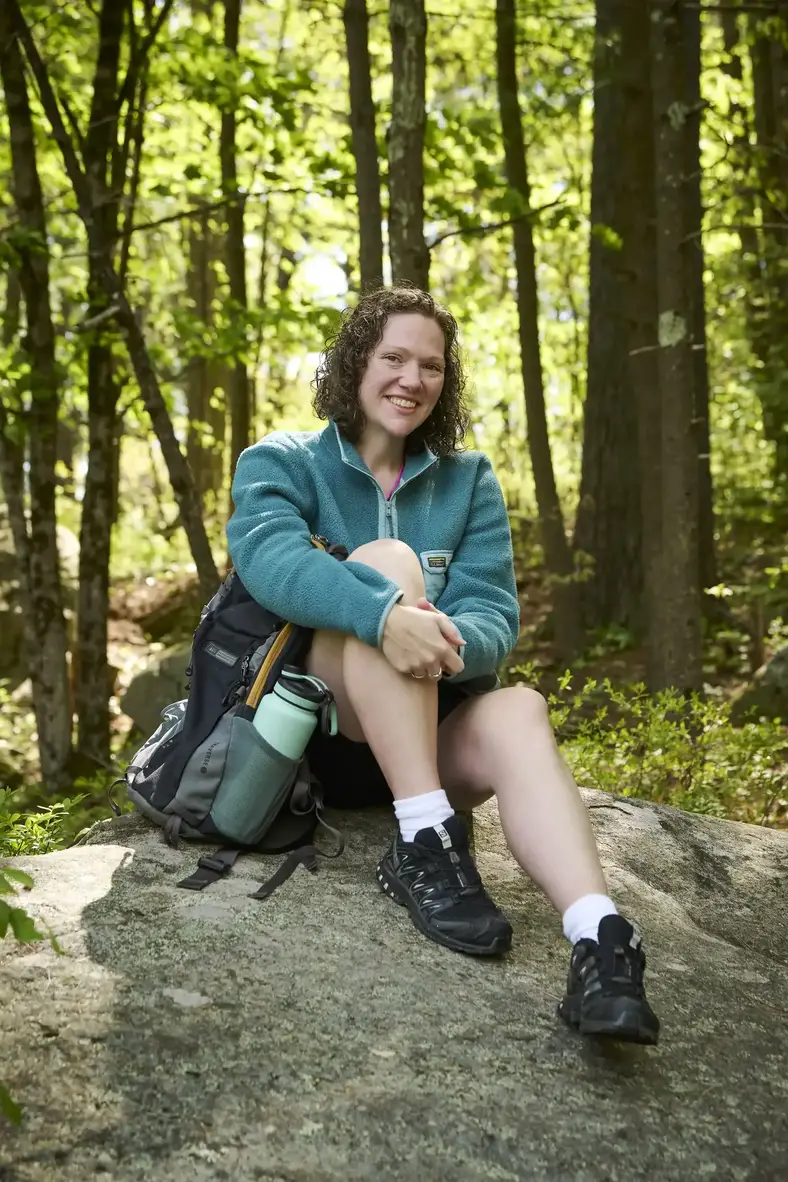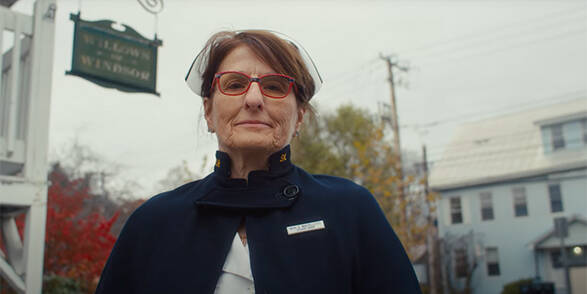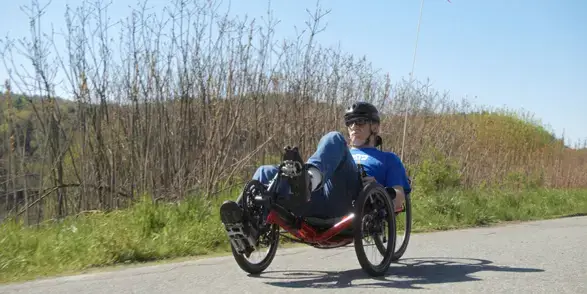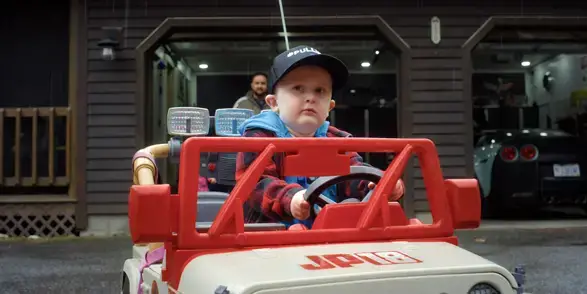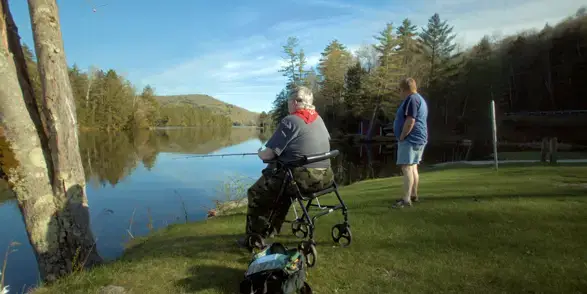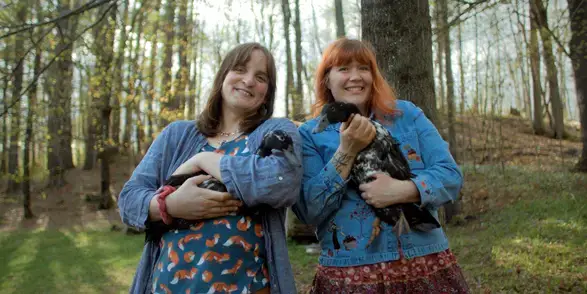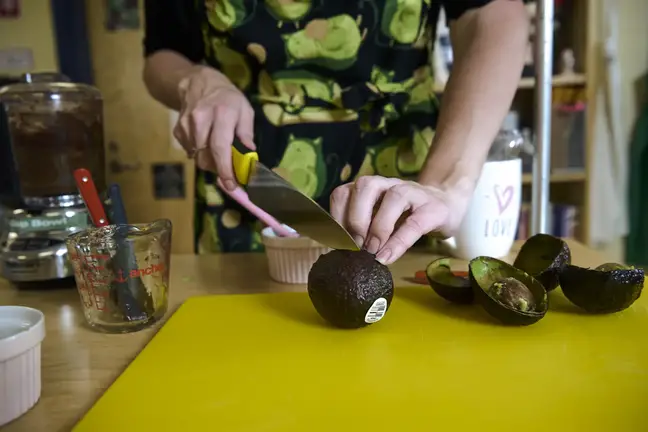
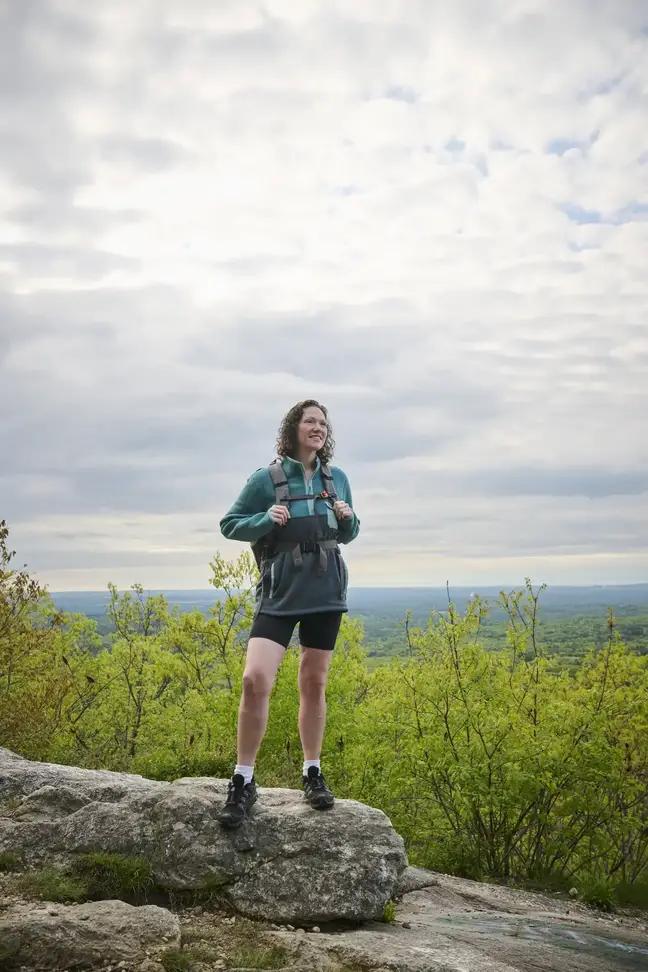

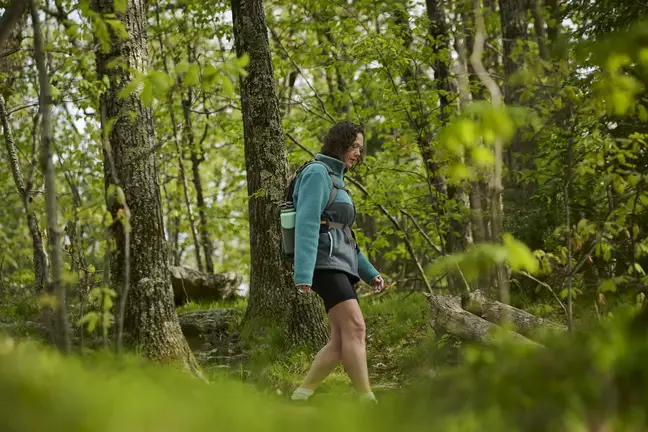
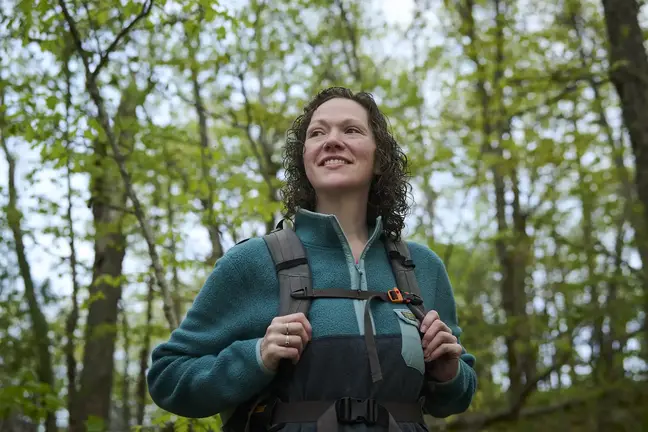
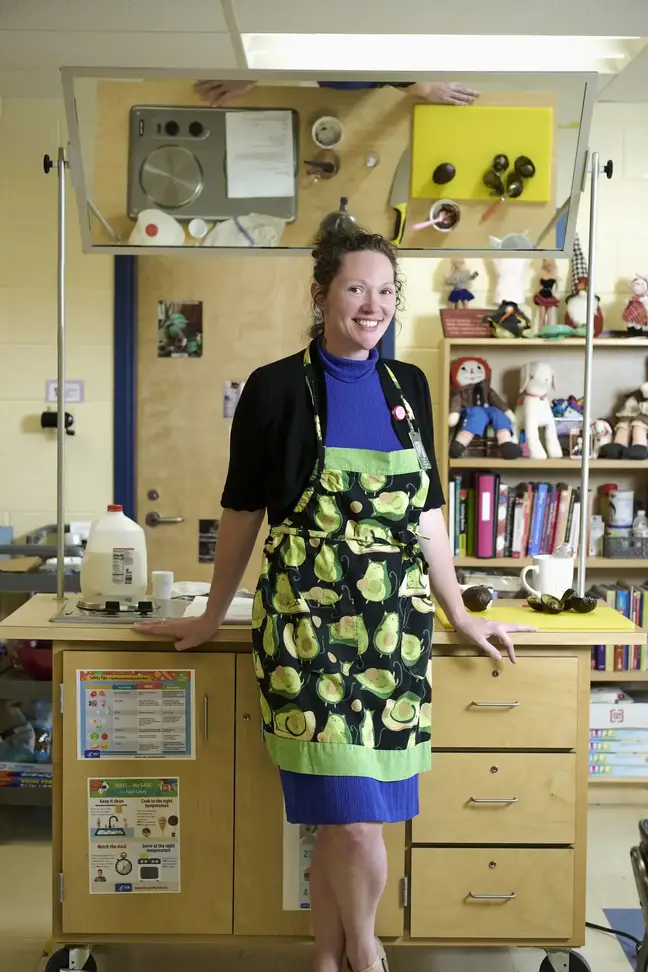
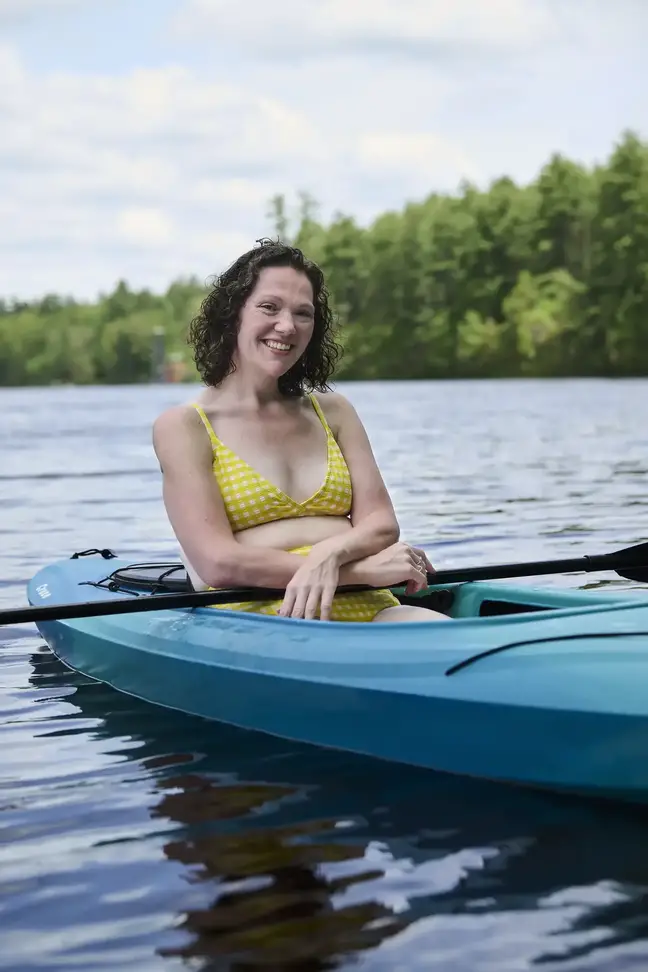
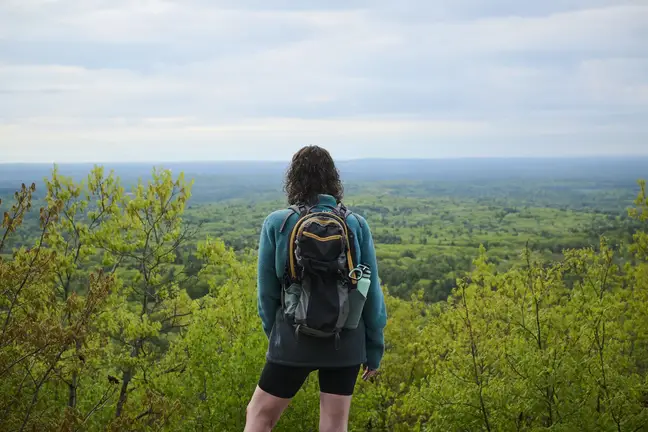
“I have my life back. I am able to go kayaking, summit Mount Washington, hike the 48 4,000-footers, and enjoy my life.”
— Krystal Kebler
Reaching New Horizons
Chocolate avocado mousse. Black bean brownies. A deep-dish chickpea cookie.
These are just some of the foods Krystal Kebler teaches her students how to make at the Iber Holmes Gove Middle School in Raymond, New Hampshire. Some of them love it, some of them think it’s weird. She doesn’t mind one bit.
As a family and consumer science teacher, Krystal knows the importance of health and nutrition.
After all, it’s a fundamental part of her own life: from the changes she’s made around her food choices, to the nearly 200 pounds she’s lost in the years following a bariatric surgery with David A. Gould, MD, from Dartmouth Hitchcock Clinics Manchester.
A dangerous path
Growing up, Krystal experienced stressful events in childhood. Her parents divorced. She lived in a domestic violence shelter. To combat anxiety, she found solace in food.
“That was a coping skill that I had chosen early on,” she said. “And I carried that throughout middle school, high school, and into adulthood.”
She also had polycystic ovary syndrome, PCOS, which made managing her weight more challenging.
Despite this, she had an interest in health and fitness, and in college decided to become a health teacher. But during times of anxiety and depression, falling back on emotional eating became the norm.
It wasn’t until a CAT scan during a non-life threatening medical emergency revealed that her liver was in danger: continuing on this path would lead to cirrhosis. This was a wake-up call.
One step at a time
Krystal originally explored bariatric surgery around 2015, but decided against it. “I wanted to be ready, but I wasn't quite there,” she said.
First, she would have to change her relationship with food, and that meant changing her mindset. She started cognitive behavioral therapy to work on changing small habits and address the root causes of her choices, and strategies to make better ones.
Krystal worked with Sarah H. Finn, MD, from the Weight Center at Dartmouth Hitchcock Clinics in Bedford, to address her weight, and more recently, her liver.
The first step would be to stop drinking diet soda, something she tried to do in the past without success. By using the tools provided by Finn and being honest about what was working, Krystal made progress. “We had to problem solve sometimes to figure out what the right solution was. But I was able to achieve my goal,” she said.
“I do feel that having the connection with Dr. Finn through the Weight Center has helped me to be successful, Krystal said. “I feel I'm supported. I feel I have someone I trust.”
A few years later, she went into surgery with a can-do attitude. Cirrhosis was not going to be part of her story. Gould performed her surgery. Within 48 hours, she walked a full mile with her sister at Livingston Park.
“It felt so amazing to be able to walk that one mile again, and not have my back hurting me, not having my knees hurting me,” she said. “Within the first 48 hours, I felt free.”
Reaching new heights
It takes approximately 2,000 steps to walk a mile. Hiking Mount Washington is a steep 8.5 miles, depending on which trail you take. The 6,288-foot peak is the tallest in the Northeast, and even seasoned hikers know it’s not easy.
About two-and-a-half years after her surgery, Krystal completed the hike on her third attempt. “I could not believe I had finally done it,” she said. Now, she’s planning to summit all 48 4,000-footers of New Hampshire’s White Mountains.
She can also feel comfortable dressing up as a mermaid in Mexico. She can swap clothes with friends, an activity she hadn’t been able to experience before. And now, there’s no more shame in getting in a kayak or sitting on a plane—it’s not even on her radar.
“I'm enjoying my life. I'm able to enjoy the activities that I have not been able to for a long time,” she said. “It brings tears to my eyes.”
And as for her students, it comes back full circle: “I’m hoping that I’m the teacher I needed when I was their age,” she said. Black bean brownies included.
More patient stories from around Dartmouth Health
Susan's Way Forward
Cardiac Patient
Treated by
Jock N. McCullough, MD / Lisa M. Olmstead, RN / Debra Fitzpatrick, RNC, AANAC / Sydney Reigle, MS, ACSM-CEP, ACSM-EIM
Treated at
Dartmouth Hitchcock Medical Center / Valley Regional Hospital
Peter's Way Forward
Colorectal Cancer Survivor
Treated by
Jeffrey R. Harnsberger, MD / Jenna Noone, RN, BSN
Treated at
Dartmouth Cancer Center at Dartmouth Hitchcock Clinics Manchester
Chris's Way Forward
Stroke Rehabilitation Patient
Treated by
Belinda M. Needham-Shropshire, OT, MAPT, MBA / Cheryl Beaulieu, CCC-SLP
Treated at
Mt. Ascutney Hospital and Health Center
Connor's Way Forward
Pediatric Cancer Patient
Treated by
Angela M. Ricci, MD / Geraldine Rubin, MD / Filomena Kersey, RDN, LD
Treated at
Dartmouth Health Children’s at Cheshire Medical Center / Dartmouth Health Children’s at Dartmouth Hitchcock Medical Center
Kathy's Way Forward
Orthopaedic Surgery Patient
Treated by
Timothy J. Lin, MD, MS
Treated at
Alice Peck Day Memorial Hospital
Krystal's Way Forward
Bariatric Surgery Patient
Treated by
Sarah H. Finn, MD / David A. Gould, MD
Treated at
Dartmouth Hitchcock Clinics Bedford / Dartmouth Hitchcock Clinics Manchester
Clover's Way Forward
Gender Affirming Care Patient
Treated by
Cheryl A. Sturgis, MSPAS, PA-C
Treated at
Dartmouth Hitchcock Medical Center

